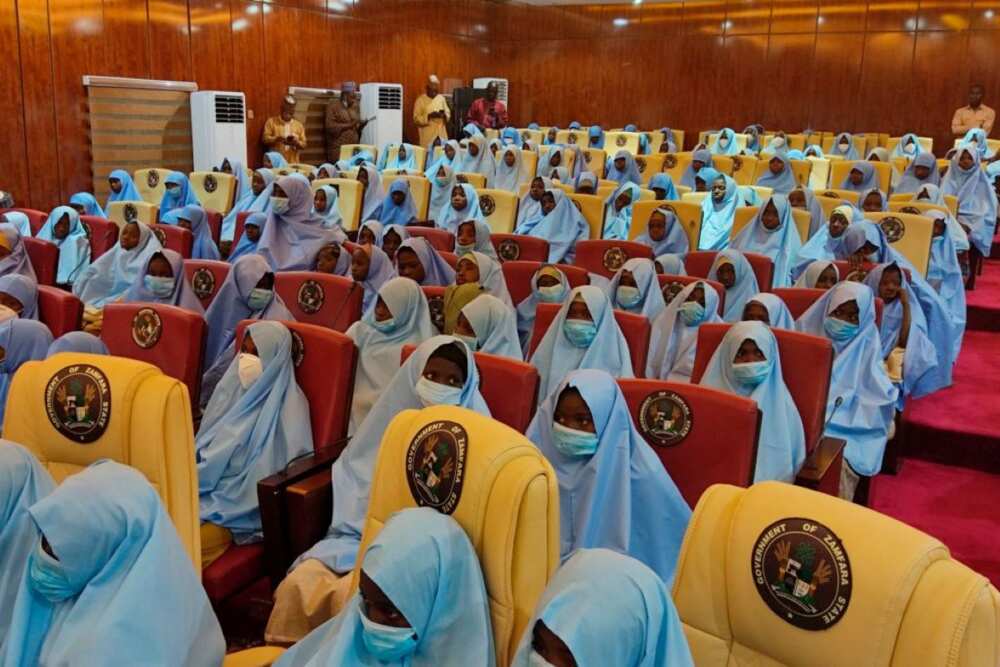"Fear of Boko Haram Attacks, Banditry, Others Prevent Girls From Going to School," New Report Says
- Attacks in schools by terrorists and bandits have been listed as the major barrier to increased girls' enrollment in schools in the north
- This was disclosed in a report launched by the Partnership to Engage, Reform and Learn (PERL) in Abuja on Tuesday, December 13
- PERL also encouraged educational institutions to ensure they play a role in making the learning environment safe for girls by improving channels for reporting abuses and threats
Legit.ng is celebrating business personalities of 2022. See top entrepreneurs of Fintech, Startup, Transportation, Banking and other sectors!
Against the backdrop of the increasing number of out-of-school children especially in the northern part of Nigeria, a new report has said that several girls are afraid to go to school due to fear of attack, kidnapping and assault.
These attacks can either occur when the girls are on their way to school, within their learning environment and sometimes even at home.
The report, "Emerging Barriers to Girls Education: Security and COVID-19 Experiences, 2022" said girls' access to school is also frustrated by long walking distances which exposes them to the risk of harassment and threats on the commute to school, lack of sufficient class infrastructure, poverty or parents' inability to pay schooling costs among many others.

Source: Getty Images
Launched in Abuja on Tuesday, December 13, by Partnership to Engage, Reform and Learn (PERL), a seven-year public sector accountability and governance programme funded by the United Kingdom's Foreign, Commonwealth and Development Office (FCDO), the study was conducted in three key states in the north - Jigawa, Kaduna and Kano states.
PAY ATTENTION: Join Legit.ng Telegram channel! Never miss important updates!
Impact of terrorists and bandits' attack on northern communities
The report focuses on understanding girls' learning experiences including the anxiety they face due to the lingering insecurity in Nigeria, especially across states of the northern region.

Read also
Year in review: Top political promises made by presidential candidates ahead of 2023 elections
Speaking at the event, PERL's gender and inclusion advisor, Titi Fakoya, said that it is also important that the launch of the report is coming at the peak of the 16 Days of Activism - a time when people around the world unite to raise awareness about gender-based violence and call for improved laws and services to end violence against women for good.
Fakoya noted that the impact of the insecurity ravaging the northern part of the country is overwhelming on girls more than boys as assault cases are also on the rise.
She said:
"Girls are afraid of going to school due to distance or fear of attacks, kidnap or assault either in school or on their way to school."
Fakoya also categorised some of the barriers to an increased number of girls' enrollment in schools, into physical, economic, health, personal and social and cultural barriers.
According to the gender expert, entrenched gender norms which reinforce early marriages and domestic chores over the education of girls have played key roles in hindering girls' education.
Also, unwanted pregnancies, poor water, sanitation and hygiene (WASH) and lack of facilities for menstrual kits influence whether Nigerian girls are able to participate fully in educational programmes.
Improving girls' education in northern Nigeria
PERL in its report said there is a need to address the underlying societal norms and behaviours that underpin violence as part of the wider push for safer, more inclusive and empowering environments for girls of school age.
It also said that educational institutions can play a role in stemming abuse and violence through awareness, safeguarding the students improved reporting channels should there be any case of GBV.
The reports said:
"School environment may implicity reinforce harmful gender and themselves be the setting of abuse, in the forms of sexual acts in the exchange for good grades, male dominance or aggressions."

Read also
Kidnappers in trouble as Ogun state government set to deploy drones on Lagos-Ibadan Expressway
Nigerian government's efforts
In his address, the minister of state for education, Goodluck Opiah, said it is important to note that the issue of poor enrolment, retention and completion rate of the girl-child prevalent in the northern part of Nigeria has been attributed to some cultural and systemic barriers."
He assured that the would serve as a key resource that will inform key policies of government across all tiers and especially, as the ministry engages in the review of the Ministerial Strategic Plan (MSP) that will cover 2023 -2027.
He expressed optimism that the report will also form part of the continuing body of knowledge from FCDO’s portfolio of prior education sector programmes; as well as stir commitments from all stakeholders in the education sector to work towards tackling the emerging barriers to girls’ education in Nigeria.
How we enrol 'drop-out-married' girls into schools in Kano community, father highlights
Parents in Tarda community in Ungogo local government area of Kano state have adopted different measures to ensure their girls are not enrolled but stay in school to complete their basic education.
One of such parents is Mustapha Abdullahi Tarda whose focus is on making sure that girls who were married off earlier go back to school.
Also, mothers in the community encourage each other through an association supported by United Nations Children’s Fund and the Foreign, Commonwealth and Development Office.
Education experts reveal why Nigeria is experiencing low learning outcomes
Legit.ng had earlier reported that experts across the country have called for strategic approaches to improving learning outcomes in school children.
The experts warned that 70 per cent of the children who are currently in school are not even learning.
According to them, there is also a need for all stakeholders in education to work towards ensuring teachers' development bearing in mind, the importance of training and retraining school instructors.
Source: Legit.ng



